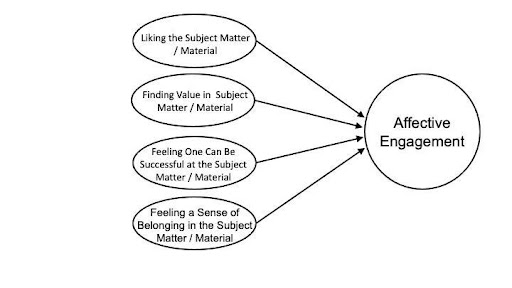
Contemporary research conceptualizes student engagement as the interaction of three components: behavioral, cognitive, and affective/emotional engagement. The typical college course measures behavioral engagement, through student attendance and completion of assignments, and cognitive engagement, through student knowledge and skill assessments. However, it rarely measures affective/emotional engagement.
Affective engagement is what drives student learning, but educators lack practical ways to capture students’ affective engagement in a course. Common measures of student engagement emphasize a students’ connection to the school community and their academic engagement in general, rather than emotional engagement specific to a particular course they are taking.
An often-repeated adage from improvement science—“You can’t improve what you don’t measure”—is at play here. Lacking a convenient, valid measure of students’ affective engagement, instructors struggle to enhance student affective engagement and improve their courses. This absence of measurement tools is particularly problematic for the many instructors who face low student engagement in their online courses. Busy college instructors are left to try to connect the dots between theoretical models of engagement and tactics they might try in their class, with no way of capturing data on whether their new practices influence students’ affective engagement.
We tackle these issues in our paper “Bridging Theory and Measurement of Student Engagement: A Practical Approach,” forthcoming in the Online Learning Journal. In this paper, we provide a model of affective engagement based on expectancy value theory, which conceptualizes “motivation” as including both the value a learner sees in a task and their expectations for succeeding at it.

A student’s sense of affective engagement is multi-faceted and consists of four distinct clusters
We chose to apply our course-specific approach to measuring affective engagement to Introductory Statistics because close to 1.5 million college students take this course every year to fulfill a mathematics requirement for their degree. One out of three undergraduates enrolling in Introductory Statistics fail to complete the course with the A, B or C grade needed to qualify for course credit. To develop our model, we first assembled relevant survey items from existing measures of student engagement and attitudes toward statistics. We then selected items aligned to our theoretical model, and made modifications to them where necessary so that the item would apply specifically to statistics and mathematics courses, and be usable in both online and in-person courses.
Our analysis of responses to these items from over 900 students taking introductory statistics showed that affective engagement is multi-faceted.
Affective engagement items formed four distinct clusters:
The results from our study advance our understanding of course engagement in a few ways. The multiple dimensions of affective engagement point educators toward an array of refinements to course content and activities to enhance value, expectations, and sense of belonging. The resulting affective engagement survey itself is a tool educators can use as they try new approaches. In addition, instructors can use these survey items in both online and face-to-face courses, which allows them to gauge whether shifts in their course’s modality impact student engagement. Finally, our survey items can be tailored easily for use in courses in other subjects.
To learn more about our research on teaching and student learning in college introductory statistics courses, as well as our broader post-secondary research area, please visit our webpage at statsresearch.org.

We want to hear from you!
Please take this 5-minute survey and help us serve you better.
